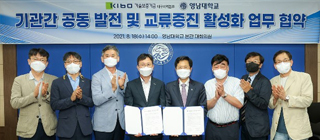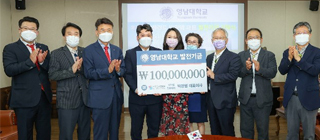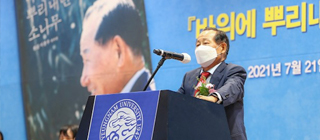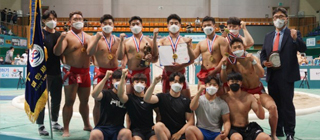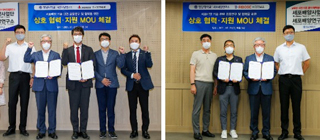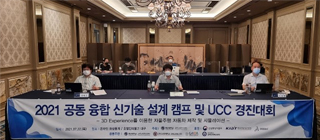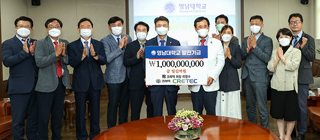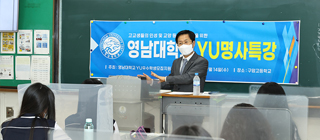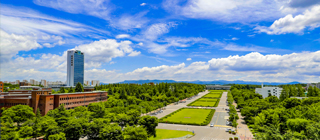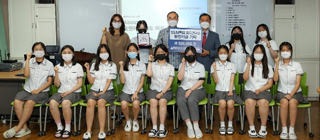-
Industry-academic cooperation for fostering customized human resources for the needs of public institutes and local industries Constructing a community development network through human and material exchange between institutes [August 18, 2021] YU and the Korea Technology Finance Corporation Daegu headquarters entered an MOU for fostering local human resources. This MOU ceremony was held at 2 p.m. on the 18th at the YU Main Hall 3rd floor conference room joined by YU Education Innovation Department Vice President Kim Jae-chool, LINC+ Project Team Leader Bae Cheol-ho, and Korea Technology Finance Corporation Daegu Headquarters Regional Director Lee Gwang-yeol. Through this MOU, YU and the Korea Technology Finance Corporation Daegu Regional Headquarters agreed to cooperate for ▲fostering outstanding human resources meeting the needs of public institutes and local industries ▲student exchange for public institutes and industries such as field work, internships, etc. ▲construction of a cooperation system customized for the society to realize urban regeneration, town communities, and social economy ▲joint pursuit of personnel exchange and networking among local universities, governments, public institutes and industries ▲construction of various cooperation networks for the mutual development of the community through personnel and materials exchange ▲and to carry out government-funded projects such as the regional leading university fostering project, industry-academic cooperating leading university fostering project customized to society, etc. YU Education Innovation Department Vice President Kim Jae-choo commented, “A university and local public institute is teaming up to foster local human resources,” and added, “The university will take the lead for not only developing the industry through human resources, but also to contribute to the growth fo the local society.”
-
Supporting international students from developing countries at the Park Chung Hee School of Policy and Saemaul Pursuing international development cooperation projects with international cooperation organizations in Africa through YU’s global network Presenting a new industry-academic cooperation model of universities-businesses-international cooperation organizations for ‘synergy effects’ [August 10, 2021] Megagen Implant President Park Gwang-beom donated 100 million KRW to YU (President CHOI Oe-chool) as development funds. At 11 a.m. on the 9th, Mr. Park Gwang-beom met with YU President CHOI Oe-chool and donated 100 million KRW expressing his wish to help with the development of the university. The development fund donated by Mr. Park will be used to support international students at the Park Chung Hee School of Policy and Saemaul. Mr. Park stated, “We have been maintaining good relations with YU through international development cooperation projects through the global network built by YU. The global human network possessed by the university was very helpful for us to continuously pursue health and welfare improvement projects in developing countries as a specialized medical technology company.” He added, “We will do our best to support the fostering of experts in Saemaul and international development that the YU Park Chung Hee School of Policy and Saemaul is aiming for.” The development fund donation was the result from the partnership in the international development cooperation project that is being pursued together with YU. Megagen Impact entered a trilateral MOU with YU and LVRLACC (Lake Victoria Region Local Authorities & Counties Cooperation), which is an international cooperation organization of three African nations back in 2018. This MOU was made possible through the global network built by YU, and it drew great interest from society as a new type of industry-academic cooperation model in which a Korean university and company pursued international development cooperation projects together with international cooperation organizations. Megagen Implant, which possesses world-class medical technologies, is pursuing public health and welfare improvement projects in Eastern Africa. YU President CHOI Oe-chool said, “In addition to Megagen Implant, which possesses world-class medical technologies, pursuing international development cooperation projects, the fact that it is supporting the fostering of human resources in developing countries can have a great synergy effect for the company, university and developing country.” He added, “Starting with the passing on of knowledge in the Saemaul and international development sector that YU has accumulated, it is a model for a new type of industry-academic cooperation and a good example for expanding global exchange.” We hope that global exchange will grow to various fields such as society, economics and culture by utilizing the global network of YU. Korea has become the first country to be recognized by the UN Back on July 2 to have transitioned from the poorest country to a developing country, and now a developed country. I would like to once again thank President Park Gwang-beom of Megagen Implant who made the generous contribution to society at a juncture where we must now play a role fitting to a developed country.
-
Publication ceremony for <Pine Tree Rooted in Stone> held at the YU Chunma Art Center on the 21st “Value of life is determined not by ‘gathering’ but by ‘sharing’!” Entrepreneur who put into practice his beliefs for his entire life ‘Social spotlight’ on his life that practiced ‘social responsibility’... Used in regular courses at YU [July 23, 2021] “Value of your life is determined not by how you gather, but by how you share!” Lee Jong-woo, the chairman of Korea Former, who is a successful entrepreneur who overcame hardships in life and his thirst for learning through passion alone, is also a businessman who practiced his belief that life is determined not by ‘gathering’ but by ‘sharing’ throughout his entire life. His autobiography ‘Pine Tree Rooted in Stone’ that details his life was published. The title of his autobiography was named after his nom de plume ‘Songam’, which is translated into Pine Rock. The publication ceremony of his Chairman Lee’s ‘Pine Tree Rooted in Stone’ was held at the YU Chunma Art Center Convention Hall at 1.30 p.m. on the 21st. At the publication ceremony were present Yeungnam School Foundation Chair Han Jae-sook, YU President CHOI Oe-chool, YU General Alumni Association Chairman Jung Tae-il, as well as former governor of Gyeongsangbuk-do Kim Gwan-yong, former president of YU Lee Sang-cheon, and other noted figures from different parts of society who respected Chairman Lee to congratulate the publication. Other YU alumni who were unable to be attend due to protective measures against the spread of COVID-19 sent their congratulations through a video. President of the Yang Joon-hyeok Baseball Foundation Yang Joon-hyeok, Head coach of the Indonesian national football team Shin Tae-yong, and ‘Mister Trot’ singer Lee Chan-won also congratulated the publication via video. Scholarship recipients of the Songam Lee Jong-woo Scholarship Foundation also thanked and congratulated Chairman Lee. Chairman Lee was born in Japan in 1938 and returned to Gimcheon, Korea in 1946 after Korea gained independence, but soon lived through the Korean War spending his youth in pain and poverty. He did not receive official education, but had an undying passion for learning, and after being discharged from the Air Force and working as a civilian employee for the military in 1946, he enrolled at the YU College of Mechanical Engineering at the late age of 27. He packed two meals in the morning where he would eat one at work on the military base and the second one for dinner at school, and graduated after four years while working in the day and studying at night. Chairman Lee said, “It was a very hard time financially that I had trouble coming up with tuition. Whenever I think about my wife and children back then, it always pierces my heart. I thought a lot about whether I was being too selfish as the head of the family.” He added, “I was sorry to my children and I am filled with gratitude toward my wife who stood fast and protected our family. It was possible to publish this autobiography because of my wife and children who always supported me.” He said that the life he made was all thanks to his family. Chairman Lee founded Korea Former, which is a company that specializes in the production of lightweight steel frames and partition materials, back in 1977 and wrote his own story of success. He ceaselessly conducted research and technological development with the resolve that ‘though there may be failure, I will never give up’ and introduced new technologies in Korea to lead the localization of construction materials and the development of the industry. In the 1980s, his business took off by winning bids for the construction of the 63 Building, which was the tallest building in Asia at the time, as well as the LG Twin Tower building in Yeouido. Considering how hard his life was, it would seem natural for him to enjoy some luxury for himself, but even to this day, he drives a 10-year-old mid-sized car and it appears that he will never give up on the conviction that he had since he was young. “I never wanted to ride in a car driven by a chauffeur. I’m more comfortable and used to commuting driving myself or using the subway. I’m fine with living with just the amount I need. I am just thankful that my wife and children understands me.” But unlike being strict on himself, he is very generous when it comes to 'sharing.’ In 2019, he made news by donating real estate worth 5 billion KRW to his alma mater, YU. While serving as a director for the Yeungnam School Foundation, he witnessed the difficulties for renovating the Science Library, and then decided to donate a large sum as development funds for renovation costs. The YU Science Library has completed renovations and is preparing to welcome students. Chairman Lee also founded the ‘Songam Scholarship Association’ at YU in 2002 to help his juniors having difficulties with studies, where he has donated over 1.2 billion KRW in scholarships up to now. Outside of YU, he established the Songam Lee Jong-woo Scholarship Foundation where he delivered scholarship funds for high schools and colleges around the nation to help foster talented human resources. He was recognized for his contributions to the development of education in the Republic of Korea and last year, he received the honor of being awarded the ’Order of Civil Merit, Peony Medal’ from the government. A 260-page book is no way near enough to contain the entire life of Chairman Lee. But his life of practicing responsibility and a lifetime of sharing as a businessman seems more than sufficient to receive the limelight from society. “Having the company create profits and grow is in itself fulfilling as an entrepreneur. But the efforts of an entrepreneur should contribute to the nation as well. Creating jobs, contributing to the development of the local and national economy, and sharing the value created with the society you live in as a social responsibility is much more important.” Perhaps it is only natural for Chairman Lee who has such convictions to return the fruits of his success to society and to practice sharing. He says that he will continue to practice the act of sharing for the rest of his life just as he has done so for his past 80 years. The publication of his autobiography ‘Pine Tree Rooted in Stone’ might actually be a new declaration for the live of sharing that he will live in the future, rather than being an organization of his life so far. YU President CHOI Oe-chool attended the publication ceremony and stated in his congratulatory address, “I thought a lot while reading Chairman Lee Jong-woo’s autobiography. It was especially evident that the records of his life contained the entire history of the Republic of Korea. Korea, which was at one point the poorest country in the world, has now become a developed nation and is leading the development of developing countries, and his life is in close contact with it. I will do my best in education so that the spirit of ‘sharing, serving and creating’ that is imbued in the history of the Republic of Korea and the life of Chairman Lee can be passed on to the future generation/” Meanwhile, YU plans to use Chairman Lee’s autobiography in regular curricular classes. It aims at taking a look at the life of Chairman Lee who is a senior of YU and a socially respected businessman and to foster the second and third Lee Jong-woos by teaching his philosophy on life to his juniors.
-
Returns to the throne after two years by winning the college group tournament Sweeps medals in individuals with 1 gold, 1 silver, and 2 bronze medals [July 22, 2021] YU Ssireum Team that won the college group tournament at the 58th Korean Presidential Cup National Ssireum Championship (Photo source: Korea Ssireum Association) YU defeated Inha University 4-2 at the college group tournament held at the Jeongeup Citizen’s Sports Center in Jeongeup, Jeonbuk on the 20th to take first place. YU took the lead 3-0 with Seo Min-gyu (Sports Science, senior) winning in the Gyeongjang class (-75kg), Park Seok-ho (Special Physical Education, junior) in the Sojang class (-80kg), and Kim Gyeong-bae (Sports Science, senior) in the Cheongjang class (-85kg), and from the sixth match, Jung Jong-jin (Special Physical Education, junior) won in the Yongsa class (-95kg) to take the victory with a score of 4-2. Thus, the YU Ssireum Team once again took home the championship after two years since winning in 2019 at the Cheonhajangsa Ssireum Championship. The YU Ssireum Team also swept the college individuals held on the 21st. Kim Gyeong-bae took first place in the Cheongjang class, Lee Sang-yeon (Special Physical Education, senior) took second place in the Yongsa class, while Seo Min-gyu in the Gyeongjang class and Lee Hyeon-seo (Special Physical Education, sophomore) both took third place. YU Ssireum athletes awarded in the individual rounds (From left to right: Dispatch Coach Lee Yong-ho, YU Ssireum Team Lee Sang-yeon, Kim Gyeong-bae, Seo Min-gyu, Lee Hyeonseo, and Head Coach Heo Yong) YU Ssireum Head Coach Heo Yong said, “I am thankful to the athletes who trained hard without complaining despite the hot weather. I would especially like to thank Dispatch Coach Lee Yong-ho from the Gyeongbuk Ssireum Association who upgraded the individual capacities of the YU athletes.” He added, “I would also like to extend my appreciation to the advisors and employees who spared no support so that the athletes could train safely despite the difficult conditions. We will do our best to take advantage of our streak and continue to perform well.”
-
YU Research Institute of Cell Culture enters joint research agreement with specialized corporations such as Neo-Cremar and T-Ribose Pursuing localization research of core materials and technologies for ‘cell culture medium’ that depends completely on imports costing 400 billion KRW a year Requires government-academic-industrial cooperation to create new industries and lead the bio-industry [July 22, 2021] The bio industry research led by the YU Research Institute of Cell Culture (Chief Choi In-ho) will gain momentum in its technological commercialization. On the 21st, the YU Research Institute of Cell Culture entered joint research agreements for the development of core materials and technologies related to the cell culturing industry with two specialized companies such as Neo-Cremar (CEO Kim Jae-hwan) and T-Ribose (CEO Kim Yong-gwan). Neo-Cremar is the only functional food materials company in Korea listed in KOSDAQ. It is currently actively researching alternative meats and it is planning to launch vegan meat made with plant-based proteins. With this MOU, it plans to commercialized cultured meat through joint research with YU to pioneer not only the domestic market, but also overseas markets. T-Ribose is a newly established company aiming for the localization of cell culturing medium, and it is constructing a GMP (Good Manufacturing Practice; rules for manufacturing and quality management of pharmaceutical products, etc.) needed for producing cell culturing mediums in the Uiseong Bio Valley that is currently being constructed in Uiseong-gun, Gyeongbuk. Cell culturing technology is involved with growing animal cells outside of its body and it is a core technology used not only for basic research (basic life science, medicine, pharmacology, etc.), but is also used heavily by companies that produce biopharmaceutical products (antibody, vaccines, protein, stem cell medicine, etc.). The best-known case is the production of coronavirus vaccines using cell culturing by SK Bioscience, and in Korea, Samsung Biologics and Celltrion have the nation's largest culturing facilities needed for producing bio-medicine. In addition, if production of ‘cultured meat (meat produced by culturing muscle stem cells)’ that has recently become a big issue is realized in the near future, it is expected that the rate of cell culturing in the bio industry will grow. This is why the industry-academic joint research agreement between YU that has the nation’s best research and technological capacities in cell culturing and companies with expertise in relevant fields is gaining so much attention. Department of Medical Biotechnology Professor Choi In-ho, who heads the YU Research Institute of Cell Culture, stated, “The history of bio-industries in Korea is relatively short, but has made remarkable achievements. But ironically, compared to the scale of cell culturing facilities in Korea, it still depends almost completely on imports for actual cell culturing.” He added, “Especially in the case of ‘cell culturing medium’ that is basically the food for growing cells, the amount imported by Korea is about 400 billion KRW per year. It is expected that demand will grow with the development of the bio-industry in the future, but in reality, we are still importing most of the raw materials needed for producing mediums.” In order to lead the bio-industry, which is a cash crop for the future, assertive cooperation is needed from not only best-known universities and companies, but also the central and local governments.” Professor Choi has been planning various businesses for the construction of the domestic infrastructure, as well as in the development of core raw materials and technologies that are essential for cell culturing together with Gyeongsangbuk-do and Uiseong-gun since 2016. Professor Choi founded the Research Institute of Cell Culture that is joined by professors in medical biotechnology, food engineering, pharmacology, and chemical engineering as researchers back in 2017. The YU Research Institute of Cell Culture was selected as the ‘College Central Research Support Project in Science and Engineering’ by the Ministry of Education in 2020, and it will receive funding from the central and local governments for nine years until 2029, and is thus spurring its efforts to develop core technologies and materials needed for cell culturing. Professor Choi said, “The YU Research Institute of Cell Culture, Neo-Cremar and T-Ribose are developing exclusive mediums for cultured meat through joint research. The industry-academic-government cooperation will create new industries for the local society and it will serve as a hub for core materials and technology development of the domestic cell culturing industry.
-
‘Digital Twin’ technology-applied autonomous vehicle design and simulation contest held Sponsored by the YU Engineering Education Innovation Center and co-hosted by engineering education innovation centers of four major universities in Korea Constructing a collaborative education system between global companies and universities [August 4, 2021] The YU Engineering Education Innovation Center hosted the ‘2021 Joint Convergence New Technology Design Camp and UCC Contest.’ This contest, which was sponsored by the YU Engineering Education Innovation Center and co-hosted by the engineering education innovation centers of the Korea National University of Transportation, Hall University, and Hongik University, was the nation’s first joint convergence new technology design camp that used digital twin technologies to construct an education collaboration system and to design and simulate autonomous vehicles in cyber space. It was held in cyber space for a week from July 14 to 21 and the design contest was held at the Daegu Interburgo on July 22. This is the first time that multiple universities constructed an education and collaboration system in cyber space to provide engineering education for fostering human resources in autonomous vehicles, while hosting production contests. In this contest, an autonomous driving education platform produced using the ‘3D EXPERIENCE Academic Platform’ of the global digital twin company Dassault System and its affiliate Hana TS, and expert mentoring in digital twin engineering were utilized. Participants of the contest produced autonomous vehicles at a 1/10 size in cyber space using digital twin-based engineering. <Model of autonomous vehicle made using digital twin technologies (second place winner by the YU Team)> The grand prize went to the Halla Team (Bang Min-hyeok, Yeom Gwang-mo, Han Neul-chan) and the YU Team (Moon Jong-ho, Baek Yun-gyun, Yoon Do-hyun) won second place. Digital twin technology is an essential technology that has recently been used for producing autonomous vehicles, and it produces and tests the entire production process including product planning, design and assembly in a virtual environment, which can significantly reduce production periods and expenses. This technology has been reducing the production period of new vehicles by a year and a half. Through this education collaboration system, it is expected that students will be able to use digital twin technologies to continuously experience automobile engineering, simulation, and production processes, as well as autonomous driving and virtual tests through collaboration that is being emphasized in the new mobility sector. YU Engineering Education Innovation Center Director Kang Dong-jin (Professor of Mechanical Engineering) who hosted this event commented, “We constructed a collaboration system to provide direct education and experience for students in digital innovation and conversion through the collaboration of multiple universities and global companies. We will provide full support so that many students can experience the latest fourth industrial revolution technologies through continuous exchange and reach-out programs.”
-
Chairman Choi Young-soo built it as a top company with ‘responsible management’, “We will do all our corporate social responsibility” The fund scheduled to be used for constructing educational infrastructure for the School of Mechanical Engineering... Interest in fostering human resources [July 15, 2021] Korea’s largest industrial tool distribution company, Cretec (Chairman Choi Young-soo/Daegu Saemaul Association Chair) donated 1 billion KRW in development funds to YU (President CHOI Oe-chool). Cretec recently donated 500 million KRW to YU in development funds and is scheduled to donate 50 million KRW a year for the next 10 years. At 11 a.m. on the 15th, Crete Chairman Choi Young-soo who attended the development fund donation ceremony held at the YU President's Reception Room said, “As a local businessman, I am well aware of the importance of fostering local human resources.Since 50 years ago when I first started this company, our motto was responsible management. In addition to unlimited responsibility for customers, corporate social responsibility is another thing that the owner should pay attention to. As a local businessman, I will do my best in my position to develop and coexist together with the local community. I ask YU to do its best to foster human resources that will be the next leaders of Korea.” YU President CHOI Oe-chool responded, “I feel a grave sense of responsibility as the president that manages the university because of this generous donation of development funds. There are many difficulties surrounding the university, but the support from people like Chairman Choi for our school is very encouraging.” He added, “Just as how Chairman Choi built Cretec to what it is today through ‘responsible management’, YU will also do its best to fulfill its social responsibility as champions for fostering human resources who will lead the future.” Cretec has been continuously engaged in social contribution activities to foster future human resources such as elementary, middle and high school students by donating 100 million KRW to a local high school in Daegu recently, in addition to its donation to YU. YU plans to use the development funds donated by Chairman Choi for education and research activities and constructing educational infrastructure for the School of Mechanical Engineering. Cretec, which was founded in 1971, is Korea’s largest industrial tool distribution company that is based in Daegu. It imports over 13,000 different items from about 1,200 brands all around the world, and distribute it to distribution companies and industrial sites in Korea. Crete is analyzed to have contributed to developing the domestic tools industry into world-class levels by categorizing and systemizing massive amounts of industrial tool product information, and constructing a scientific distribution network. It was the first in the tool industry to implement standard pricing and a bar code system, and it also offers online orders, while realizing digitalization of product information, thus making non-face-to-face business possible for industrial tools. In particular, the “Korean Industrial Tool Handbook’ that Cretec has been publishing since 1989 has been serving as an encyclopedia for tools, and it has become a standard book for tool distributors and manufacturers. Last year, Cretec was recognized for its contributions to the development of the industry, and thus received the ‘Korean Distribution Awards Presidential Medal,’ which is the highest honor in the domestic distribution sector.
-
Over 60 lecture requests from 10 high schools in the Daegu and Gyeongbuk regions 48 lectures held in various fields including humanities, social science, engineering, medicine, biotechnology, and arts Various lectures that can help youths elevate their character and abilities, and to choose their career paths [July 19, 2021] The best humanities lectures of YU (President CHOI Oe-chool) can now be taken at high schools. By applying to the ‘YU Celebrity Speaker’ that YU is offering for the first time this year, YU professors will visit the high schools and take the podium. This program, which aims at helping to enhance the character and general education of middle and high school students and to provide the opportunity to explore career options, is very popular among middle and high school students. It made news by having well-known professors for outstanding lectures at YU will take the podium at middle and high school students. The ‘YU Star Lectures’ that was first held on June 9 has received over 60 applications from 10 high schools in the Daegu and Gyeongbuk regions such as Siji High School, Songhyeon Girls’ High School, Kyungpook National University High School, and Guam High School, and lectures are scheduled until August. Daegu Guam High School Principal Cho I-young said, “Currently, the classes available for high school students at school have limited diversity. But through the ‘YU Star Lectures’, students can gain knowledge in various areas and take liberal arts lectures as they desire. Furthermore, it will be a precious opportunity to get an indirect experience for liberal arts lectures at universities that they will later attend.” YU is offering the ‘YU Star Lectures’ using creative experience activities and after-school hours at middle and high schools. There are a total of 48 lectures from 45 professors in various fields including humanities, social science, engineering, medicine, biotechnology, and arts such as ‘American Heroism Read in Marvel Movies (Professor of English and English Literature Nam Jung-seop)’, ‘Do Geniuses Exist? (Professor of Media and Communication Joo Hyung-il)’, ‘Future Automobile Career Exploration (Professor of Future Automobile Engineering Sa Jong-yeop)’, ‘Latest AI Technologies and Semiconductors (Professor Electronic Engineering Choi Hyun-cheol)’, ‘COVID-19 Pandemic: Hidden Stories (Professor of Medicine Lee Tae-yoon)’, ‘Song Master Class (Professor of Voice Lee Hyun)’, etc. Meanwhile, plans are to expand participating faculty for the ‘YU Star Lectures’ and also organize online lectures for contact-free special lectures to provide an assortment of lectures available. Middle and high schools that want to receive the outstanding lectures of YU can fill out an application and send it via e-mail(yustar@ynu.ac.kr). Details are available at the YU admissions homepage (www.enter.yu.ac.kr) or you may contact the YU Admissions Office (053-810-1088). YU Admissions Office Director Shin Yong-ho said, "Professors of YU are giving lectures to youths at their eye level with wide-ranging topics from liberal arts such as humanities, arts and science, easy and fun introduction if majors, and recent social issues such as AI and the COVID-19 pandemic, and have thus been quite popular.” He said, “We will listen to the opinions of education recipients such as adolescents and middle and high schools, and provide an assortment of exchange activities between colleges and middle and high schools to create programs that can help students select their career paths.”
-
Institute of Information & Communication and Institute of Life Sciences to receive a total of 14.7 billion KRW over 9 years to perform R&D Goal of future automobile core technology ‘reliability and ultra-safety’... Strengthening industrial competitiveness and fostering specialized personnel ‘Inter-disciplinary convergence research’ with the goal of coming up with comprehensive solutions for senior ‘sarcopenia’ [July 9, 2021] YU’s attached research institutes - Institute of Information & Communication (Head Park Yong-wan) and Institute of Life Sciences (Head Kim Choon-young) - were selected as College Central Research Centers in the science and engineering sector in 2021 by the Ministry of Education. The ‘College Central Research Center Support Project’ that is hosted by the Ministry of Education and National Research Foundation is a core national policy project for the science and engineering sector that aims at constructing research hubs within universities to support infrastructure of university attached research centers to specialize college research institutes and strengthen their expertise, while also providing support to foster outstanding young researchers. With the selection for this project, the YU Institute of Information and Communication will receive a total of 7.8 billion won from state and local government funding from nine years starting this year until May of 2030 to pursue R&D projects related to future automobiles. YU Institute of Information and Communication Head Park Yong-wan (Professor Information and Communication Engineering) stated, “R&D related to future automobiles tend to focus on configuring autonomous driving functions, and there is relatively insufficient research on procuring the safety and reliability of future automobiles. Malfunctions of sensors, radars, cameras, etc. that are the core technologies of future cars can result in serious safety issues.” He added, “We will focus on research to procure reliability and ultra-safety of core parts to secure industrial competitiveness in the future automobiles sector.” The YU Institute of Information and Communication plans to pursue projects for gaining ultra-safety and reliability for the operation of future cars through the development of life expectancy prediction technologies and safety diagnosis of environment-detecting sensors of future cars. Another major objective of the project is to strengthen domestic and foreign competitiveness of local automobile parts companies through automobile and ICT technology convergence, while also expanding the localization ratio of automobile conversion parts. It is also expected to do its role as a hub research center for fostering human resources for future automobiles, through joint research and cultivating experts through industry-academic cooperation. The YU Institute of life Sciences will also receive a total of 6.9 billion KRW until May of 2030 to pursue the ‘inter-disciplinary convergence sarcopenia diagnosis and intervention solution development and commercialization to respond to the ultra-aged society’ project. The Institute of Life Sciences that conducts research with the goal of improving quality of life will engage in convergence research based on medicine, kinematics, ergonomics, food nutrition science, and IT sectors to come up with an integrated solution for ‘sarcopenia’ that causes muscle loss among senior citizens. For this, Professor of Food and Nutrition Kim Choon-young that heads the institute, Professor of Clothing and Fashion Park Soon-ji, Professor of Electronic Engineering Lee Chan-soo, Professor of Physical Education Shin Sung-hoo, and Professor of Medicine (Orthopedics) Kim Gi-beom, and other experts of various sectors will participate in this study. Chief of the YU institute of Life Science Kim Choon-young said, “Our goal is to share awareness about sarcopenia that will be given a disease code starting this year to the general public, and to enhance accuracy of diagnosis and prescription to provide practical benefits to senior citizens.” She added, “We will collaborate with companies to commercialize research results and we will also develop functional exercise programs and develop exercise assistance instruments and functional foods. As we have entered the ultra-aged society, it is also crucial to collaborate with local governments to create efficient health policies while improving the health of Korean senior citizens. We will foster experts through continued collaboration with companies and research centers related with local governments, and promote overseas networking in order to become a global hub research center for sarcopenia.” In addition to the two institutes selected at YU, a total of seven were designated as college central research centers such as the Institute for Clean Technology, Institute for Cell Culturing, Dokdo Institute, Institute for Higher Education Policy, and the Institute for National Culture.
-
Extracurricular activities for proper historic awareness on Dokdo such as ‘Dokdo Newspaper Contest’, etc. Produced goods attached with ‘Dokdo PR Characters’ drawn by students for sale, and donated some of the proceeds YU Dokdo Institute plans to produce ‘Dokdo Plants Postcards’ and use it for educating adolescents [July 9, 2021] “We want the YU Dokdo Institute to take the charge in sharing with the world that Dokdo is our history and backed by historical facts!” Students and teachers of the Daegu Songhyeon Girls’ High School (Principal Park Young-do) are cheering on the YU Dokdo Institute. On the 8th, they donated 500,000 KRW in development funds to the YU Dokdo Institute. The students and teachers came together to support the education and research activities to share information about Dokdo, which is Korean territory. Recently, Songhyeon Girls’ High School held an in-school ‘Dokdo Newspaper Contest’ to raise awareness about Dokdo to students and to engage in “Our Territory Dokdo” PR activities. About 100 students participated in this contest and students drew ‘Dokdo PR Characters’ on the bottom of the newspaper as part of this contest. The development funds donated by Songhyeong Girls’ High School came some of the proceeds from making antibacterial mask patches with Dokdo PR characters that were sold to members of the school. Ms. Choi Eun-young, who is in charge of after-school education at Songhyeon Girls’ High School said, “We have been constantly offering extracurricular courses such as Making Dokdo Newspapers so that students can have proper historical awareness on Dokdo. Students also participate actively. Students study about Dokdo and using some of the earnings from PR activities, they donate it to institutions related to Dokdo, which can teach many things to them. We will continue to plan and pursue various extracurricular activities so that students can can develop proper historical awareness and character.” <Dokdo Newspaper and Dokdo PR Character Mask Patch made by students of the Daegu Songhyeon Girls’ High School> The Dokdo Institute plans to use the development funds donated by Songhyeon Girls’ High School to produce ‘Dokdo Plant Postcards’ and use it for educating adolescents. In addition to their donations to the YU Dokdo Institute, Songhyeon Girls’ High School also delivered the remaining proceeds and 2,600 mask patches to medical professionals through the Daegu Dalseo-gu Office. Second-year student Koh Jin-ju of Songhyeon Girl’s High School who participated in the Dokdo PR activities said, “The Dokdo Newspaper making activity was an opportunity to gain deeper understanding about Dokdo, which is our territory. I hope that every Korean will show more interest about Dokdo.” YU Dokdo Institute Director Choi Jae-mok said, “It is quite pleasing to see the youths, who are the future of Korea, being so interested in Dokdo and taking the initiative to promote Dokdo. The YU Dokdo Institute, which is an educational and research institute specializing in Dokdo, will engage in activities with a greater sense of responsibility.”
